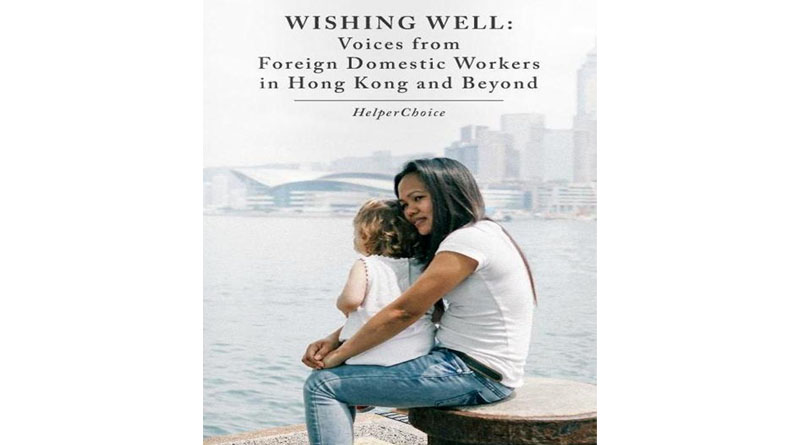FDWs Share Hope, Sorrow in New eBook

Image Caption: Cover of eBook “Wishing Well”
THEY cry, smile, laugh, hope, and dream.
In “Wishing Well: Voices from Foreign Domestic Workers in Hong Kong and Beyond”, 18 migrant workers wrote about their experiences in leaving behind their home countries and family and living and working in their employers’ home.
The free-to-read eBook was launched by HelperChoice, a web-based platform that facilitates the hiring process between foreign domestic workers and employers in Hong Kong, Singapore, the Middle East, and other regions.
The eBook’s title was taken from the final piece in the collection – “The Game That Binds.”
“Cecil Calsas compares Hong Kong to a wishing well, ‘where one throws a lucky coin and utters the dream of getting a good life’,” wrote Ju-chen Chen, a lecturer at the Chinese University of Hong Kong and one of the book’s co-editors, in the introduction.
“Not all wishes are granted, not all dreams materialize and not all who arrived in high spirits go home alive,” said Calsas.
The first section of the book called “Portraits” was described by Chen as pieces that “tend to take on a more upbeat and celebratory tone”.
“Portraits”
Raquel Evangelista in her “Selfless” essay wrote that taking care of her employer’s three children was like “caring for and loving my own son.”
Monina Pitogo’s poem “A Mother’s Love” expressed her longing to hold her own child while taking care of other kids.
Eunice Sacliwan in “I Promised My Son a Toy” expressed that she was ready to endure the difficulties of being a foreign domestic worker to keep her promises of a toy, a pair of shoes, and clothes to her son.
“No matter how much it hurts, no matter how many tears and how much sweat I shed, I will keep those promises,” she said.
“Whispers”
The second part of the book was called “whispers”, whose pieces lean “toward the introspective and reflective.”
“They showcase FDWs outside the workplace and tease out identities other than the worker, resembling a bustling chorus of ‘whispers’,” said Chen.
Riz Peher in the poem “Dreams (Never) Come True” shared why she had to put to rest her dream of becoming a professor. She said that her decision to work as domestic helper paid off with all her siblings getting their university degree.
Arumy Cerpen’s short story of “Sia in the Storm” expressed her conflicted feelings about taking care of her six-year-old ward (Linda) and leaving the care of her three-year-old toddler (Sia) to her mother.
“I ended up spending two years with Linda. The sweet girl made me fall in love with her, of course, without losing my love and guilt toward Sia,” she said.
And when she finally came home, Cerpen said she was devastated to see Sia running away from her instead of giving her a hug.
Jacqueline Formento’s poem “Remembrance” echoed Cerpen’s sentiment.
She said that she feared her child’s wrath, and the accusations and the silent metallic anger when she left the kid.
Then there were essays by Monina Maria (“No One Really Knows”), and Frecel Paringit (“Flight), detailing how living in a foreign land, and away from their family strengthened their faith.
“I may be trading a dark path right now, but I know that I will reach the end and finally see the light, in God’s time,” said Maria.
“Whatever storms life brings I will never collapse, only be shaken, because I found God and he picked up my broken pieces,” Paringit said.
And Calsas shared the story of the Philippine Sluggers women’s baseball team in “The Game That Binds”.
She said that through baseball, members of the team bonded by telling each other of their stories of sacrifices, stories told in between innings, and stories “that bind a team that became a family away from home.”
The book was launched by Helper- Choice so other entries submitted to HelperChpice’s “Be a Journalist” competition in April could be published too.
“We hope that by reading this book, the public – and specifically employers – will gain a deeper understanding of the emotional journeys that their domestic helpers go through.
“These are incredible women who have given up so much to support their families. By understanding the adversities they endure, hopefully employers will be encouraged to treat their domestic workers better,” said Laurence Fauchon, Helper- Choice founder.
The eBook may be accessed online at https://issuu.com/helperchoice/docs/wishing_well_domestic_workers.
(Source: HongKongNews.com.hk)



